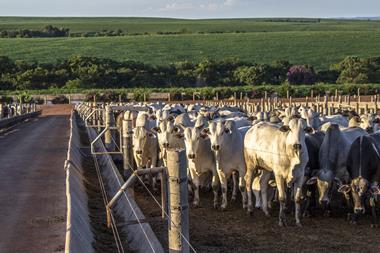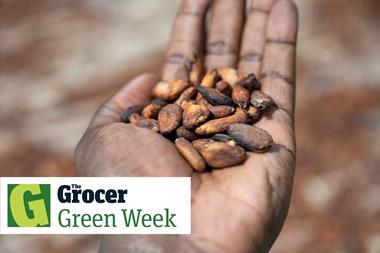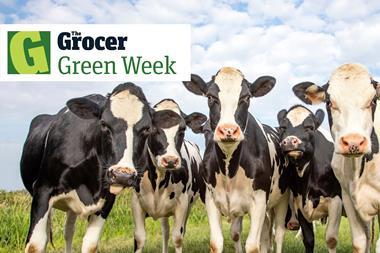
The world needs to drastically reduce the consumption of meat and other animal proteins if it is to avoid exacerbating already “devastating consequences for public health and the environment”, the new Eat-Lancet report has warned.
The agrifood sector was the “single most influential driver of planetary boundary transgression”, said the Eat-Lancet Commission, an international group of scientists who authored the report – which builds on the landmark 2019 study of the same name.
The planet had already passed six of the nine so-called planetary boundaries: climate, biodiversity, land, freshwater, nitrogen and phosphorus pollution, plus novel entities (pesticides, antimicrobials and microplastics), found the study, published on Friday.
Food systems were “the largest contributor to five of these transgressions and contributed around 30% of greenhouse gas emissions globally”, it claimed.
They also exerted a “notable impact on the transgressed climate boundary and on the ocean acidification boundary”, added the Commission.
Read more: Can Defra’s new team kickstart the government’s green ambitions?
And even with a “complete global transition away from fossil fuels”, the study revealed the impact of food systems could still push the global average temperature beyond the 1.5°C threshold above pre-industrial average temperatures – widely recognised as the point when climate impacts become significantly more severe and catastrophic.
Global dietary ‘shortfalls’
Fewer than 1% of the world’s population was currently in the ‘safe and just space’, where people’s rights and food needs were met within planetary boundaries, the report found. Meanwhile, the wealthiest 30% of people drove more than 70% of food-related environmental impacts.
Across all regions of the world, the Commission’s analysis revealed “a common shortfall: diets consistently lack sufficient fruits, vegetables, nuts, legumes, and whole grains”. In many places, its analysis also found that diets contained excess meat, dairy, animal fats, sugar, and excessively processed foods.
The Commission is therefore advocating a widespread switch to its Planetary Health diet – which encourages an increase in the production and consumption of whole grains, fruits, vegetables, nuts and legumes.
The diet also calls for significant reductions in red meat consumption, with a reference intake of just 15g a day (or about one serving per week). Though it also suggests animal protein intake could increase to some extent in certain lower income countries.
UN Food & Agriculture Organization data shows the UK average stands at about 230g a week, with the global average at 120g – reflecting how meat consumption in high income countries are often “excessive”, compared with that of many countries in the Global South.
Comment: The UK could be a leader in healthy, sustainable food systems
For poultry, the recommended intake is 30g per day (about two servings per week), and for fish, 30g per day (about two 100-g servings per week).
These values represented “substantial reductions compared to current global consumption levels”, the Commission said.
Meat ‘taxes’ floated
“Targeted interventions”, to encourage dietary shifts would also be required, the report suggested, such as price subsidies for more climate and health-friendly foods, alongside taxes on foods such as meat.
Shifting global diets “could prevent up to 15 million premature deaths per year”, claimed the report. “Reshaped systems could deliver returns of $5 trillion a year through better health, restored ecosystems and climate resilience – more than ten times the $200-500 billion investment needed to drive food systems change,” it added.
“Achieving these goals requires urgent policy action, dietary consumption transformation, and a realignment of global financial incentives to support just, resilient, and sustainable food systems,” the Commission stressed.
The Commission’s latest iteration of its research comes amid warnings, as reported by The Grocer last week, that global meat and dairy lobbies were preparing to undermine its findings and its authors’ credentials with misinformation – something campaigners at non-profit the Changing Markets Foundation said had created an “online backlash” when the first Eat-Lancet was published in 2019.
Industry at a crossroads: which path will it take and do minsters care?
Warnings the food system is in danger of meeting its climate targets echo those set out in a report published last November by the IGD and Wrap, which concluded, without “urgent action on diets”, that targets for greenhouse gas emission reductions for 2030 and 2050 would be unachievable. Meat and daiory concumption in the UK would need to be cut by 20% to meet the government’s legally-binding 2030 net-zero targets, the report warned.
A new report, published by IGD and EY this week, reiterated those concerns, with “net zero inaction” set to see the industry rack up £2.6bn of extra costs by 2050, driven by the mounting threats of global warming and climate change.
Planetary diet ’good for planet’
“The Commission’s findings reinforce that the Planetary Health Diet is good for both people and the planet,” said Commission co-chair Walter C. Willett, a professor of epidemiology and nutrition at Harvard T.H. Chan School of Public Health.
“By increasing the production and consumption of whole grains, fruits, vegetables, nuts, and legumes, we can improve health outcomes everywhere while respecting cultural and regional traditions,” he added.
“Our findings make it clear that transformation must go beyond producing enough calories,” said fellow cho-chair Shakuntala Haraksingh Thilsted, director for nutrition, health and food security at intergovernmantal body the Consultative Group for International Agricultural Research.
“It must guarantee the right to food, fair work, and a healthy environment for all. Only when we share the benefits and burdens more equitably can we ensure that food systems are within planetary boundaries and create a safe and just space where all people can flourish,” she urged.
Supermarket model makes food strategy ‘unachievable’ claims green body
Responding to the report, Ali Morpeth, co-founder of campaign group Planeatary Alliance, said: “The Commission shows incremental change won’t cut it. We need bold, systemic shifts that rewire supply chains and portfolios around planetary health. The businesses that act first will shape demand, define growth, and secure their place in the markets of tomorrow.”
Kate Arthur, head of nutrition at AHDB, said: “Eat-Lancet 2.0 continues the important discussion about improving the health of the global population and the planet. For the UK we need to focus on helping people transition to a dietary pattern in line with our current food-based dietary recommendations represented in the Eat Well Guide.
“This is a balanced diet, rich in plant-rich foods but importantly includes meat and dairy. If people were to follow this dietary pattern, we would see improvements in both health as well as a 30% reduction in emissions.
“Yet in the UK less than 1% of the population follow the Eatwell Guide recommendations, so a greater focus on encouraging better adherence is a public health priority. Animal-sourced foods, including lean red meat and dairy, play a central role in providing nutrient-rich, affordable, and culturally relevant options in the UK diet.”



















No comments yet